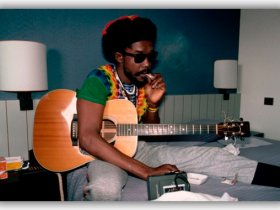Tosh received similar abhorrent treatment in 1978 while in the custody of the police at the Half-Way Tree lock-up to the extent that he suffered a broken arm while using it as a shield to protect his head.
Through music, talk, and action, Tosh, who had been arrested for a marijuana spliff in that Half-Way Tree incident, was always a staunch lobbyist for legalisation of marijuana. His 1976 recording Legalize It, the album's title track, became very popular among pro-ganja adherents and Rastafarians all over the world.
He didn't mince words in the song as he urged the establishment to simply legalize it.
In his 1979 recording Buk-In-Hamm Palace on the Mystic Man album, Tosh went further to urge:
"Light yu spliff, light yu chalice/ Mek we smoke it in Buchingham Palace/ Lend me a paper, lend me fire/ Mek we chase wey all them vampire"
Mystic Man included the cuts Fight On, Crystal Ball, and Rumours of War. The album seemed to have ushered in his unusual unicycling, which became a part of Tosh's shows as he would ride on to stage to the amusement of his fans.
The Half-Way Tree incident that led to Tosh's arrest was not devoid of drama. According to Tosh, he was in the company of some of his musicians in the vicinity of the Aquarius Club, preparing to do some rehearsals, when he suddenly felt someone snatch his extinguished spliff from his hand.

Tosh promptly grabbed back his spliff and a struggle ensued, resulting in blows to his head, body, and arms. Tosh claimed that when he was being taken to the lock-up, he had not yet sustained any serious injuries. The police version was that upon accosting Tosh, they identified themselves, but he resisted with several blows to the constable and the verbal rebuttal "A dis you a carry me a jail for police boy?"
From his earliest days in the music business Tosh's lyrics and ideas established his reputation as being outspoken and uncompromising on matters of injustice and as an artiste who challenged the establishment without fear or favour.
His earliest recordings with The Wailing Wailers, The Wailers, and by himself indicated the direction in which his career was heading. Tosh declared his hand with his first solo effort for Studio One, between 1965 and 1966, I'm the Toughest.
Performing for the Jobig sub-label, Pressure beat, Tosh continued his unrelenting musical onslaught on the establishment in the early 1970s with sharp, biting lyrics as he proclaimed in the recording Dem Ha Fe Get a Beaten' that 'I cant stand this no longer/ The wicked get stronger/ I can't stand this no longer/ The battle is getting hotter/ Them have fi get a beaten.../ Don't you wait till you back is against the wall/ Just one step to progress and I know Jah will help you all."
Tosh continued his attack on the system with three powerful tracks for producer Lee Perry - Downpresser Man, 400 Years, and No Sympathy.
He covered a range of topics in his songs, with equality and justice, the fight against apartheid, and the legalisation of marijuana being the most prominent. The last is of paramount importance to Jamaica at this time in the aftermath of the death of Mario Deane under controversial circumstances while in the custody of the police. It brings into sharp focus the need to revisit laws concerning persons in lock-ups and for a closer look to be given to the ganja laws in Jamaica, which caused Deane's incarceration in the first place.
After the albums Catch a Fire and Burnin', Tosh exited the company of The Wailers in 1974, with his anthemic call to:
Get up, stand up, stand up for your rights,
Get up stand up, don't give up the fight.

Sung and co-written by Tosh, it became an international freedom anthem and the anthem for Amnesty International. Now considered an international freedom fighter, Tosh started his own record label and enterprise, Intel Diplo H.I.M.(Intelligent Diplomat for His Imperial Majesty) and created his own band, Word, Sound, and Power. Out of that aggregation came an unending flow of revolutionary songs on equal rights and justice.
In the title cut from one of his first two albums, Equal Rights, which attained certified platinum status, Tosh declared: "I don't want no peace. I need equal rights and justice." The Legalize It album, which attained gold status, became a constant plea to legalise marijuana.
At the 1978 One Love Peace Concert at the National Stadium, while Bob Marley was busy joining the hands of Michael Manley and Edward Seaga, Tosh used the occasion to admonish and chastise them for their failure to enact ganja legalisation laws. The extent to which Tosh would take his advocacy for the legalisation of marijuana in Jamaica is best revealed inBuck-In-Hamm Palace.
Tosh's collaboration with Mick Jagger produced the albums Bush Doctor(1978), Mystic Man (1979), and Wanted Dread and Alive (1981). No Nuclear War, his last album, earned him a posthumous Grammy in 1988, approximately one year after men invaded Tosh's home and murdered him.
Original Story by The Gleaner: http://jamaica-gleaner.com/gleaner/20140831/ent/ent4.html













 less
less
 more
more